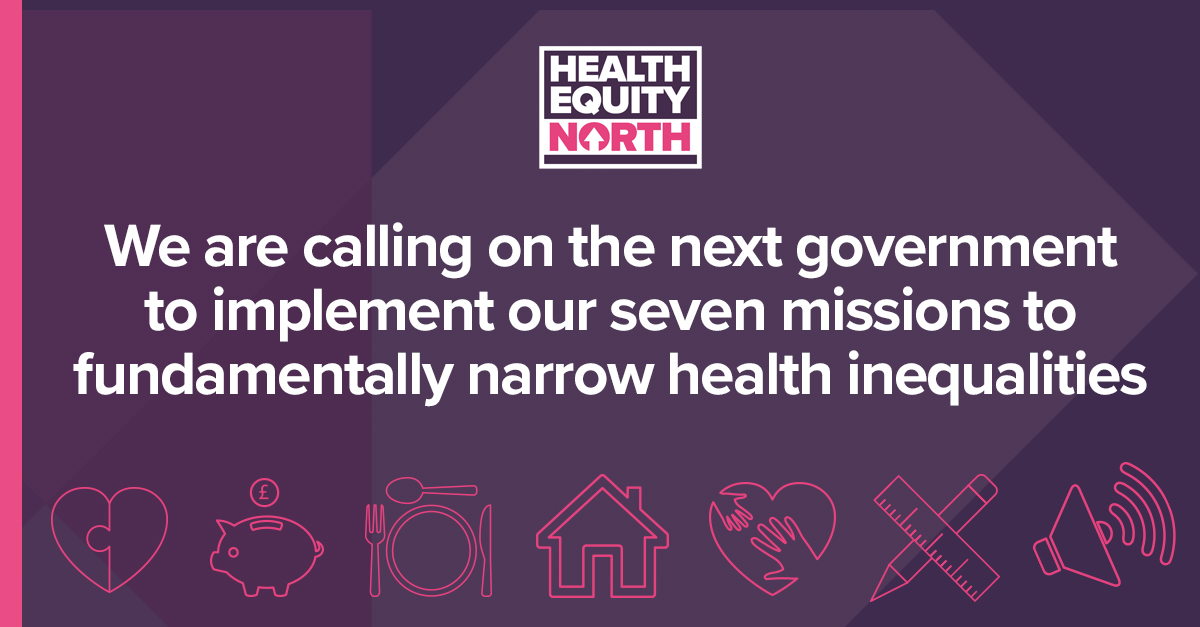Health Equity North’s Seven Missions

Health inequalities in our country are increasing, adversely affecting physical and mental health while also contributing to declining productivity. Evidence shows that elevating the North’s health to match the rest of the country could inject £13.2 billion into the economy.
In the North of England, inequality continues to grow. We urge the next government to adopt our seven evidence-based missions to significantly reduce health disparities. Embracing these missions will enhance the health and wealth of the entire nation.
The seven missions are:
1.Create a national strategy to reduce health inequalities
Evidence shows that over a 10-year period, it is an achievable aim to reduce the health gap between the most deprived areas of the country and the national average by 10%. This can
largely be achieved by addressing the wider determinants of health including education, poverty, productivity and employment rates. Evidence shows bringing up the North’s health to that of the rest of the country would put £13.2bn into the economy.
2. Tackle poverty through evidence-based policies
Lifting the poorest out of poverty will have a huge impact on health over the life-course. Evidence shows a key focus should be put on reducing relative child poverty. Measures to do this include: committing to end child poverty, getting rid of the two child cap on Universal Credit, increasing child benefit and getting rid of the five week wait for Universal Credit.
3. Give children in the North enough food of good quality
Good nutrition is essential in supporting life-long health according to evidence-based research. Use existing data to auto-enrol all eligible pupils for Free School Meals (FSM) and give FSM to all children on Universal Credit. Eligible families should be auto-enrolled into the Healthy Start Scheme to support adequate nutrition from early years onwards.
4. Give people warm homes of a good standard
Evidence shows the impact of warm homes on health. Extend financial support to groups most in need, especially: carers, those dependent on essential powered medical equipment, and low
income households not in receipt of means-tested benefits. Introduce financial support for those using prepayment meters. Introduce a social tariff for fuel-poor and vulnerable households. Prioritise action to improve the energy efficiency of all homes.
5. Support communities and families to access health and social care easily
Focus funding for family hubs that offer a life-course approach, from Sure Start programmes to ageing well, to physical and mental health, in the most deprived communities is an evidence-based approach to improving health. This would take into account current access to healthcare, bus routes and other amenities and utilise and build on existing community assets taking a place-based approach to need.
6. Fund schools in the North of England fairly
Evidence shows schools are on the front line in combatting mental health issues and supporting pupils’ wellbeing. Immediately implement changes to the National Funding Formula to offer more support to schools in deprived areas, taking into account historic under-funding of schools in the North of England.
7. Give people in communities that are not often consulted a voice
Use Children’s Rights Impact Assessments to make sure children and young people’s needs are being met. Use devolved Citizens Assemblies to make sure a wide range of voices from relevant places and regions are included when making policy decisions. This is an evidence-based approach to supporting the needs of these communities and young people.



